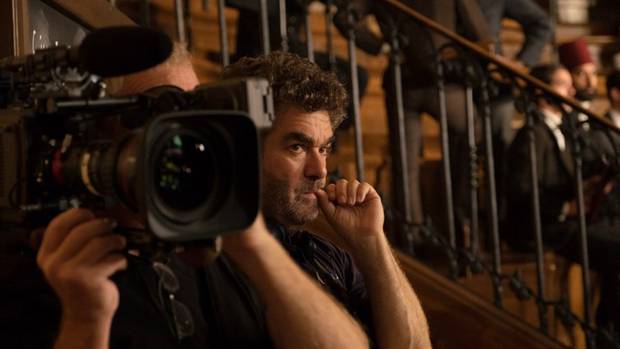Hollywood is littered with movies about movies. Some, like any behind-the-scenes exercise you'd find as a bonus feature on a Blu-ray, are mere marketing exercises. Others are works of art themselves, equalling or surpassing the heights of the films that they have been designed to document. Think of Hearts of Darkness: A Filmmaker's Apocalypse by Fax Bahr, George Hickenlooper and Eleanor Coppola; or Les Blank's Burden of Dreams, which chronicles the madness of Werner Herzog's Fitzcarraldo. To add to this latter category is Joe Berlinger's Intent to Destroy, a new doc focused on both the making of Terry George's recent melodrama The Promise, but also the entertainment industry's long history of suppressing the 1915 Armenian genocide, which George uses as a backdrop for his Christian Bale-starring film.
Just after Berlinger screened Intent to Destroy at the Tribeca Film Festival in New York and Hot Docs in Toronto, The Globe and Mail spoke with the acclaimed documentarian (Metallica: Some Kind of Monster, the Paradise Lost series) about denial, on-set tension, and the future of the documentary landscape.

Berlinger screened Intent to Destroy at the Tribeca Film Festival in New York and Hot Docs in Toronto.
handout
This film certainly doesn't play like something you'd find on an electronic press kit…
My intention was to make anything but a behind-the-scenes film. For me, that element allows me to make something not just about Terry's film itself, but also the genocide, and denial, and the mechanisms of denial. The making of The Promise is quite historic, as there's been a long history of seeing the story of the Armenian genocide suppressed by Hollywood studios. When I heard The Promise was being made, I knew it was an historic opportunity to make not a traditional making-of film, but to elevate the genre to tell a much larger story, one that would complement Terry's film. Take the massacre scene in The Promise – all the bodies on-screen are clothed. That's because no one wants to go into a cinema and be surrounded by a real massacre. But a documentary can show those images in a more graphic way. A feature filmmaker and a documentary maker can tackle the same subject and persuade audiences in different ways.
Was there any tension between you and Terry, then, as you were both on set, trying to work through your own visions?
I relied on the good graces of Terry and his actors and the producing team to embed with that film. If this was a Hollywood studio, a documentarian like myself would not have been given close to the access I got. But yeah, there was a little natural tension for having a camera crew from a doc on the movie set, in the sense that actors need to feel like they're being protected, not exposing themselves to outside scrutiny. I had to tread lightly. It was a 75-day shoot, so for the first couple of weeks, we kept our distance, and then started slowly moving in. If there was tension, it was simply that we each had very different jobs to do, and it was Terry's movie set.
Are you disappointed by the box office take of The Promise so far, though? [The $90-million film has earned just $7.06-million in North America.] Considering this is a long-repressed story, considering that there's been a ton of press talking about the genocide now, considering that Hollywood has a history of this story being consistently repressed as early as 1935 … If you measure things purely in dollars and cents, we live in strange movie times – what works and what doesn't work. I think that anyone who says they know what's going to work at the box office is kidding themselves. Hollywood invests mainly in huge comic-book movies or big-budget spectacles that can work around the world, so this kind of movie is harder and harder to make and harder and harder to release. Would I be happy if more people were seeing The Promise? Of course. But I don't think it's the only measure of the mission to make a film on this subject. I think that mission has been successful, in terms of generating discussion. And films these days live on beyond the box office, so I think the film will make a mark, as I hope my doc will. The irony is that even with the so-called disappointing box office, The Promise will far eclipse the box office of my documentary.
Speaking of the current industry landscape, what's the ideal scenario for a documentarian today? Are you aiming for theatrical exposure for Intent to Destroy?
Different films have different DNA, and not every doc should be released theatrically. This doc, I think, works really well with a group of people. We're planning on doing a limited theatrical run in the fall. But at the end of the day, the majority of people will see it via a streaming service or on television. Twenty-five years ago, with Brother's Keeper, I got into this business specifically to make documentaries for the cinema, because I believe in that communal viewing experience. In terms of theatrical entertainment today, most docs, unfortunately, because of the cost of tickets and audience expectations and what's going on with television, which has a golden age in regards to narratives, most docs are not going to get their biggest audience through theatrical release. That's on the wane. But what's replaced it is a multiplicity of television and streaming outlets interested in this form. It's a golden age in a different way for a documentarian.
I was curious for your thoughts on the recent film, The Ottoman Lieutenant, which is set around the same time of The Promise, but takes a very different approach to depicting the genocide.
I've been so busy that I haven't seen it or investigated the claims that there were Turkish interests involved in that film's production. But it certainly feels like it has propagandistic interests, though not having seen the film I'd be hard-pressed to say. In order to understand how we live in an age of "fake news" and "alternative facts," these two films are just a metaphor for why a doc on this subject is needed to explore the mechanisms and the aftermath of denial. Whether intentional or not, whether propagandistic or not, whether coincidental or not, the fact that two feature films take place in the same period of time and seem to tell opposing views of history demonstrate how pernicious denial can be, and why it needs to be eradicated.
This interview has been condensed and edited.
Intent to Destroy screens May 5 at Hot Docs (hotdocs.ca), with a theatrical release planned for the fall.
